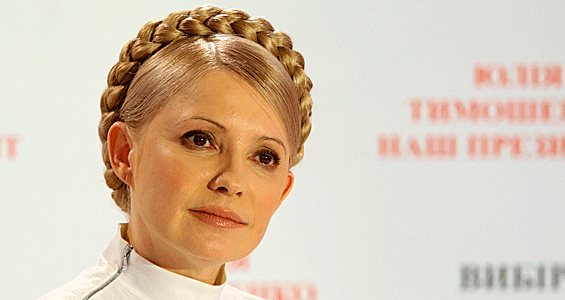Profile: Yulia Tymoshenko
Ukraine’s PM says she is the sole guarantor of democracy in the former Soviet republic.

 |
| Yulia Tymoshenko is known for her trademark peasant-style braid [EPA] |
Yulia Tymoshenko, Ukraine’s prime minister, is a former gas magnate whose impassioned speeches resonated with thousands of voters in the country’s “Orange Revolution” of 2004.
Born in 1960, in Russian-speaking Dnipropetrovsk in eastern Ukraine, Tymoshenko studied at the local university, married while still a teenage student and had a daughter in 1980.
Taking advantage of an entrepreneural climate in the Soviet Union under leader Mikhail Gorbachev, Tymoshenko’s first taste of self-made money came from a video rental store she set up in the 1980s with her husband.
In the 1990s Tymoshenko became known as the “gas princess”, when she headed Unified Energy Systems, a company that imported Russian gas into Ukraine, in a career that is believed to have amassed her a fortune.
She entered parliament in 1996 and was made a deputy prime minister in charge of the energy sector in 2000 by the new premier – Viktor Yushchenko.
But in 2001 she fell victim to political intriguing, spending several weeks in jail accused of forging customs documents and smuggling gas – charges of which she was subsequently cleared.
Orange Revolution
On leaving prison, she changed her image from brunette to blonde, wearing designer clothing and adopting her trademark peasant-style braid.
Her stylist later told media the folksy look was designed to distance herself from an association with wealth and to emphasise a national Ukrainian identity.
Tymoshenko shot on to the world stage with her impassioned speeches in the 2004 mass protests against the sleaze of a post-Soviet establishment, in what became known as the “Orange Revolution”.
Viktor Yushchenko, who swept to power following the 2004 election, appointed her as his first prime minister in 2005, but their relations became quickly strained and she was dismissed eight months later.
Tymoshenko won her second term as prime minister in December 2007, after convincing Yushchenkow to dissolve parliament after the Party of Regions and left-wing parties formed a coalition.
Her policies included compensation for depositors who lost Soviet-era savings, price controls on food and medicines to bring inflation down, calls for a review of murky privatisations and high social spending.
Tymoshenko has built better ties with Moscow in the past few years, meeting with Vladimir Putin, Russia’s prime minister, in November 2009 to broker a deal between their state energy companies.
‘Criminality and oligarchy’
Tymoshenko says she is the sole guarantor of democracy in the former Soviet republic and has promised to clean up corruption and move closer toward Europe while keeping good ties with Russia.
In the present campaign, she has ridiculed the education of Viktor Yanukovich, her opponent, and decried the support he enjoys from the industrial tycoons in the east.
“There is a majority of people in the country who are ready to vote for a democratic country without criminality and oligarchy in power,” she said after coming second to Yanukovich in a first round of voting on January 17, 2010.
“As a presidential candidate I will never allow the country to return to the path that it was on in 2004,” she said.
Many economists see her as a populist with an emphasis on strengthening a state safety net, while her policies have been described as ad hoc state interference, such as fixing price controls for petrol and food to keep inflation down.